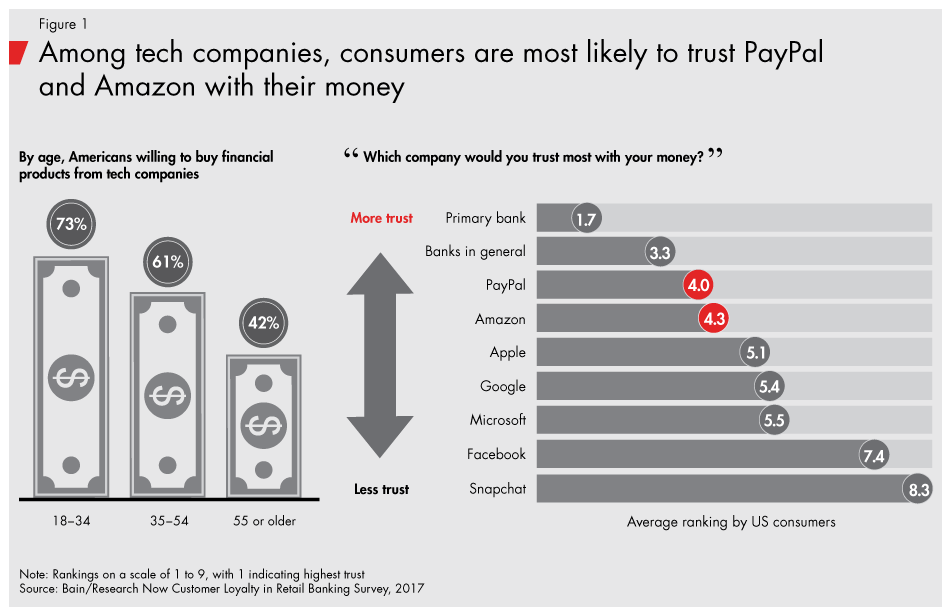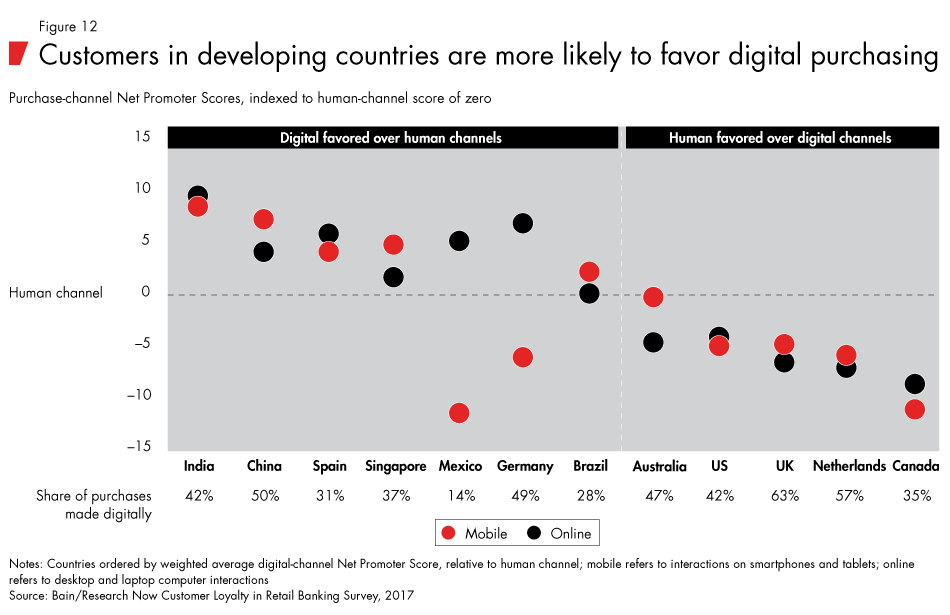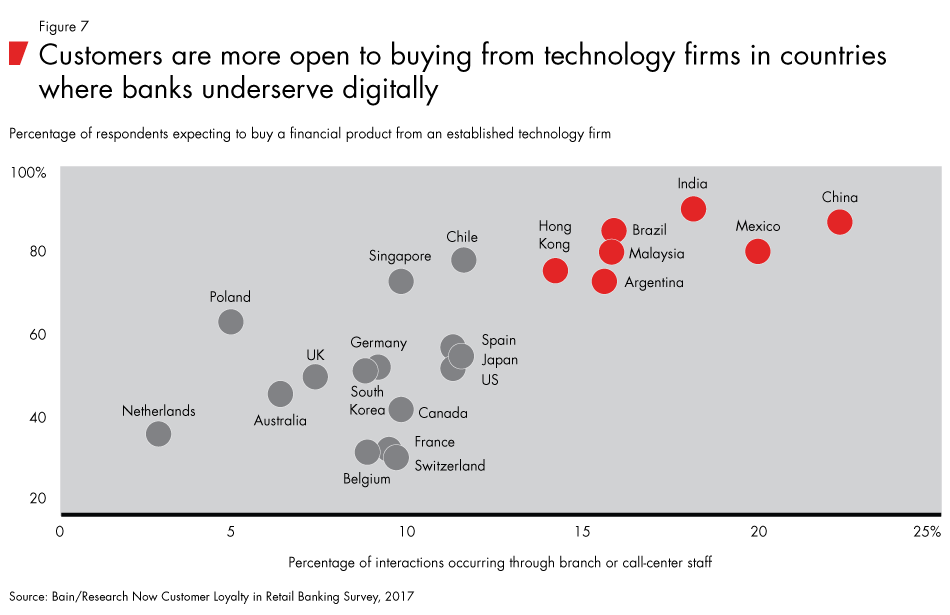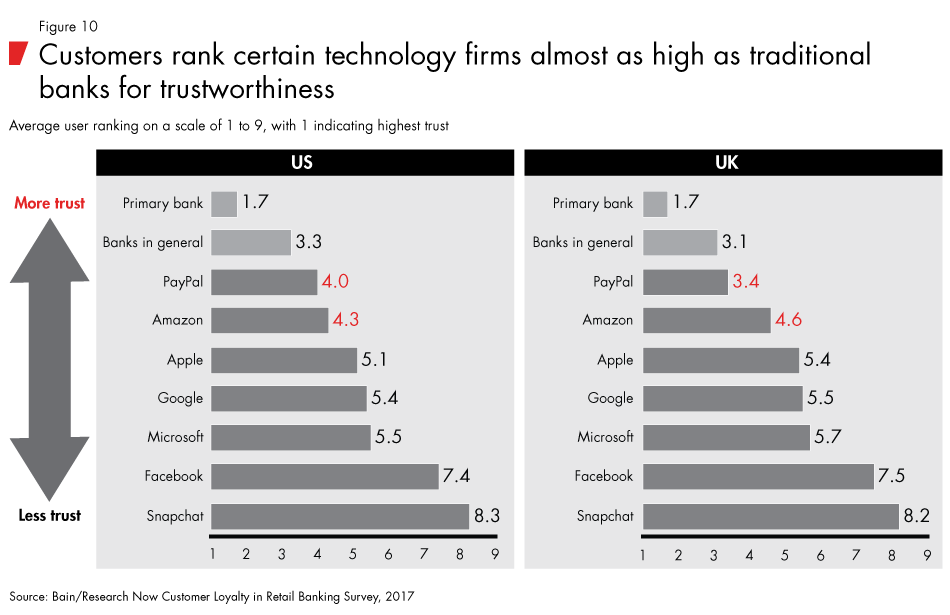
Technology firms have the potential to takeover how banking is done. Source: Shutterstock
Tech firms set to give banks a run for their money
A NEW STUDY has found that more and more consumers feel positively about the potential disruption that technology will bring to the banking and finance sector.
Fintech companies have long been heralded as bringing much needed disruption into the banking space, where asymmetrical information and high costs can act against the favor of consumers. Remittance company TransferWise and electronic bank Monese have helped set up templates for how certain banking infrastructures can be transformed by technology, while Asian players are already amassing war chests.
Alibaba’s Ant Financial has already gathered a huge money-market fund, having issued as much as US$96 billion in loans over the last five years, making it as large as the ninth biggest bank in the United States according to a study on consumer sentiments and technology firms’ banking services. Rakuten, the e-commerce banking giant from Japan operates the largest Internet bank in the country – financial services account for around 40 percent of its annual revenue.
And now, a handful of small fintech firms have already begun slicing up the finance pie of the region, creating digital options for the insurance industry, investment research services, remittance and so on. According to the study by consulting firm Bain and Co., these fintech firms such as Paypal and Amazon Cash are ranked as highly as banks for trust in the United States and the United Kingdom.

There is a high tendency among respondents to trust tech firms with their money. Source: Bain and Co.
The study, which spans 133,171 banking customers in 22 different countries said that demand for digital alternatives to traditional banking is rising. Among US respondents, an average of 59 percent across three age groups said that they would be willing to buy financial products from tech firms. The number is especially high among young people, of which 73 percent said they were open to relying on products from established tech firms
There are many reasons for why tech firms have such a high trust threshold of trust, one of them being the fall out of the 2008 financial crisis is still rippling in societies, as well as the increased visibility of technology in our lives. The pervasiveness of tech in our daily activities suggests that tech firms are even more firmly embedded in our personal lives than banks.
Furthermore, tech firms are more likely to have comprehensive and functional online channels. Customer frustration at the inconvenience of digital banking features is palpable, with 45 percent of UK respondents said that their banks’ websites lets them conduct all their banking needs on a single platform.
Another reason so many people are willing to rely on tech firm is the fact that their countries may have poor banking infrastructure, as is the case in India and Mexico. The survey found that customers in developing countries had a greater tendency to favor “digital purchasing” which is more convenient for them.

“They’re saying if you come up with an experience as simple and easy as my shopping experience is with Amazon, I’m ready to do that now,” Gerard du Toit, head of Bain’s banking practice and lead author of the report, said in an interview with Bloomberg.
“We’ve seen this happen already in China, where it’s common for people to do many of their banking activities through WeChat and Alipay and players like that.”
The study said that “demand for alternatives to traditional banks will only grow” thanks to the younger demographics in the survey. As an example, the survey found that more than a quarter of US respondents said they would consider using their voice-controlled assistants on the daily. That fact is a boon for Amazon whose Echo range of speakers embedded with the Alexa AI is currently a market leader.
“Given that Amazon, Alibaba and others already sell payment services, credit cards and loans, it’s plausible that they will offer a suite of retail banking services in the near future,” the report said.
Asian countries lead the way in the adoption of tech firms’ fintech products. Bain’s study found that around 90 percent of Indian respondents were open to new financial offerings from established tech firms, closely followed by China, Brazil and Malaysia. These countries also led in terms of penetration of digital services. The aforementioned countries registered a high level of call-center and branch-led services, meaning that more people relied on physical locations to get their banking done.

Concurrently, they were also the ones who were in favor of buying more products from technology firms, which are in most cases more convenient and cost-effective than those offered by banks.
Cost and convenience are huge factors as to why banks are more likely to lose out to big technology firms. Despite the fact that they have the upper hand in terms of established businesses, banks have been slow to migrate more transaction volume out of their physical branches and offer cheaper, digital point-of-service (POS) systems to merchants. This has meant that banks have had to spend more money to employ staff, and lose out as fintech firms unbundle many of the services they used to control.
Certain countries have already begun moving into “self-serve” forms of banking, such as the Netherlands, Poland and Australia, but most have not. Hong Kong, China and India have made great strides in reducing the number of interaction points that require actual people, but there remains a huge opportunity gap in most markets.
This gap is likely going to get eaten up once tech firms have accumulated enough service volume to take over most banking services. Du Toit told Bloomberg that it’s likely Amazon, which enjoys high trustworthiness rankings with consumers, will further penetrate the banking sector because it has the ability to scale enough to set up digital accounts without charging high fees and minimum balances.

“It’s just a matter of time before we see the big tech players enter retail banking in the US,” du Toit said. “You’re going to see a Darwinian battle between banks and tech firms, and some surprising combinations on how they get to market.”
There is a high chance that tech firms will form partnerships with banks because banks still have much more experience in conducting and managing financial services on a large scale.
“Fintechs have innovative products, but they struggle to build brand recognition or a distribution model that attracts many customers,” he said in a statement.
“On the other hand, large technology firms already have digital prowess, established brands, and customer access, which provide an almost unassailable advantage in extending their corporate brands into banking. Many also already sell payment services, credit cards and loans, so it’s plausible they will offer a suite of retail banking services in the near future.”
READ MORE
- Ethical AI: The renewed importance of safeguarding data and customer privacy in Generative AI applications
- How Japan balances AI-driven opportunities with cybersecurity needs
- Deploying SASE: Benchmarking your approach
- Insurance everywhere all at once: the digital transformation of the APAC insurance industry
- Google parent Alphabet eyes HubSpot: A potential acquisition shaping the future of CRM










